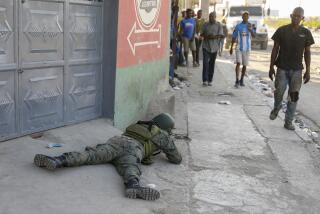Aristide keeps Haiti waiting
- Share via
Reporting from Port-au-Prince, Haiti — At the empty home of former Haitian President Jean-Bertrand Aristide, they’ve added a new coat of white paint and put fresh sheets on the bed.
Just in case.
Aristide stirred intrigue when he announced weeks ago his wish to return to Haiti after seven years in exile. Suspense grew when his U.S. lawyer came to collect the passport that Haitian officials approved for the former leader, who lives in South Africa.
But Aristide hasn’t arrived and people in Haiti wonder just what is going on. His Miami lawyer, Ira Kurzban, accuses the United States and other powers of applying pressure abroad to make sure he doesn’t return home any time soon.
“There’s no question that he’s coming back,” Kurzban said Monday by telephone from Miami. “The U.S. and France are putting maximum pressure to prevent him from coming back before the election.”
U.S. officials have said Aristide’s return would be “an unfortunate distraction” ahead of the March 20 presidential runoff.
The guessing game of whether or when Aristide might return shows his continuing ability to fire passions in this impoverished land, where he remains a hero to many slum dwellers but is reviled by wealthy elites and others who see him as an incendiary populist.
Aristide, elected president and toppled twice since 1990, declared in January that he wanted to come back — “today, tomorrow, at any time” — to work on education issues, not to reenter politics.
Thousands of Aristide supporters in the teeming capital, Port-au-Prince, have taken to the streets to urge his return. Chants of “No Aristide, no second round” suggested followers might try to disrupt the March 20 runoff if he isn’t back.
Speculation about Aristide’s return rose after exiled former dictator Jean-Claude Duvalier arrived unannounced in January, 25 years after fleeing during a popular uprising. Many Haitians said Aristide should also feel free to return home whenever he so desired.
“Aristide is a Haitian. He was born here,” said Marie Rose Jasmin, 67, peddling bouillon cubes from baskets in the quake-battered Fort National neighborhood. “If he wants to come back to help, I would love to see it.”
Others fear that Aristide would add a volatile element as Haiti struggles to rebuild after last year’s earthquake and a deadly cholera epidemic.
“Whenever Aristide is in the country, it starts a lot of violence and trouble in the streets,” said Lucon Louis, 75, who lives in a shelter of scrap wood and tarpaulins in Fort National.
U.S. officials have said Aristide should stay away during the election campaign between singer Michel Martelly and former First Lady Mirlande Manigat, both conservatives.
Kurzban said Aristide faces obstacles in returning on a commercial flight along routes overseen by U.S. allies. It is unclear, he said, if South Africa would allow him to travel on a private flight.
Many people think diplomatic pressure has already succeeded in scotching plans for Aristide’s return. Others say he might not be sure what kind of reception he would get on landing.
“My feeling is that he’s worried about his security and about what the U.S. and French might do if he comes back,” said Robert Fatton, a Haiti expert at the University of Virginia.
Even if Aristide returned after the election, his popularity in some quarters might make it difficult for him to stay clear of politics. He would join a scene already crowded with political players: outgoing President Rene Preval, Duvalier and candidates Martelly and Manigat.
To some leftist activists, the hunger for Aristide’s return is a symptom of drift within the grass-roots movement he once led to election victory.
Patrick Elie, who used to work alongside Aristide, said the fractured Fanmi Lavalas party, excluded on technical grounds from the first round of presidential voting in November, has fed followers “hogwash” that he would be back soon.
Elie said the party and the broader movement known as Lavalas failed to move beyond Aristide’s charismatic pull.
“In 25 years, we were unable to develop a collective leadership,” he said, “and this is the price we’re paying now.”
Special correspondent Allyn Gaestel contributed to this report.
More to Read
Sign up for Essential California
The most important California stories and recommendations in your inbox every morning.
You may occasionally receive promotional content from the Los Angeles Times.










